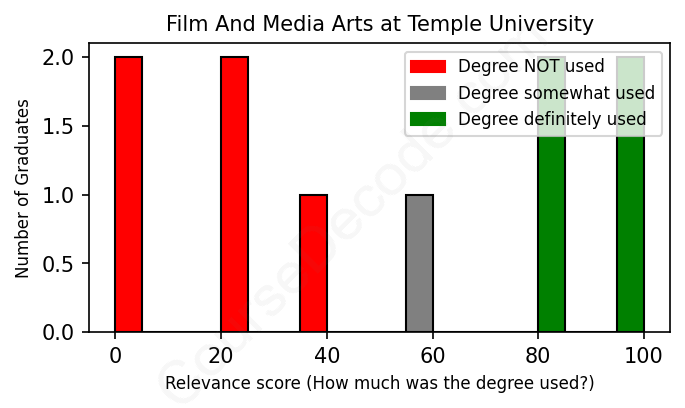
First, some facts. Of the Film And Media Arts graduates from Temple University we've analyzed , here's how many have used (or NOT used) their degree in their career:

These are estimates based on AI analysis of 10 LinkedIn profiles (see below).
The verdict? Significantly below average. Overall, with an average relevance score of 49%, Film And Media Arts graduates from Temple University have a much lower likelihood (-18%) of finding work in this field compared to the average graduate across all fields:
And for comparison, here's the chart for all profiles we've looked at across all degrees.
Also, after graduating, only 10% of these graduates have pursued further education other than another Bachelor's degree (such as a Masters degree or other), compared to the average across all profiles of 35%. This suggests a Bachelors degree is enough for most Film And Media Arts graduates, and it's normal to look for work straight after graduation.
See the details:
|
Relevance score: 20% We think this person has NOT gone into a career related to their degree. We think this person has NOT gone into a career related to their degree.
DEGREE INFOGraduated in 2019 from Temple University with a Bachelor of Arts - BA in Film And Media Arts. No other secondary education since. JOB HISTORY SINCE GRADUATIONClosing Team Lead Target Sep 2020 - Jun 2023 Multimedia Technician  Waveguide LLC Jun 2023 - Dec 2023 Community Team Lead  WeWork Jan 2024 - Present ABOUTWell-versed Video Professional with a Bachelor of Arts - BA focused in Film and Media Arts from Temple University. Skilled in Cameras, Camera Operation, Cinematography, Editing and Media Production. Experienced leader with a demonstrated history of working in the retail industry. |
The top 10 most common jobs done by the graduates we've analyzed (ranked most common to least) are:
When analyzing the career paths of Temple University graduates with a degree in Film and Media Arts, one thing stands out: a significant number of them have ended up in jobs that are either tangentially related or completely unrelated to their major. While many alumni have pursued roles that involve practical application of their film skills—like editors, videographers, and production assistants—lots of others have taken on jobs that don’t really need the creative flair or technical skills that their degree provides. For example, there are quite a few graduates working outside the film industry in fields like mechanics, sales, and food service. This suggests that while their degree offers valuable skills, it may not always lead directly to a job in the media field.
However, it’s great to see that a solid percentage of graduates made their way into relevant positions like editors at various media companies or as production staff in TV and film. These roles directly utilize skills acquired during their studies, aligning well with their educational background. But overall, the landscape seems pretty mixed—while some grads have definitely carved out successful media careers, many others are working jobs that don't really leverage what they learned about film and media arts. This might reflect the competitive nature of the industry or the broad skill set that comes from such a degree, allowing for flexibility in career choices.
Here is a visual representation of the most common words in job titles for Film And Media Arts graduates (this is across all Film And Media Arts graduates we've analyzed, not just those who went to Temple University):

Graduates from the Film and Media Arts program at Temple University seem to follow a mixed bag of career paths. When you look at their first jobs right after graduation, you see a lot of entry-level positions in production assistance, internships, and even roles completely unrelated to film, such as working in retail or security. For example, one graduate shifted from a promotions intern at a local TV station to a mechanic at a bowling center. This suggests that while some may have found immediate connections to their degree, others had to pivot into completely different fields initially.
Fast forward five to ten years later, and the trajectory becomes a bit clearer for those passionate about the film and media industry. Some alumni have carved out solid careers, particularly in editing and production roles, especially in television. They often started as production assistants or editors and moved up to more specialized positions, like story producers or sizzle editors. However, it's also evident that there’s a fair share of graduates who seem to have stepped away from the media world, opting for jobs in fields such as facilities management or even general retail. Overall, while there are notable successes within the industry among these graduates, there’s a significant number who haven't landed roles directly related to their studies, making it a bit of a challenge for new grads looking to break into the competitive media landscape.
Honestly, the Bachelor degree in Film and Media Arts at Temple University can be pretty challenging, but it really depends on your passion and involvement in the subject. It’s not just about watching movies and shooting films; you’ll be digging into theory, critiquing work, and tackling various technical skills, from editing to sound design. If you’re super into storytelling and are willing to put in the time and effort, it can be a rewarding experience, but it might feel overwhelming at times, especially with the creative projects and deadlines. In general, it’s not the easiest degree out there, but if you love what you’re doing, it can definitely be a fun ride!
Most commonly, in the LinkedIn profiles we've looked at, it takes people 3 years to finish a Bachelor degree in Film And Media Arts.
Looking at these Film and Media Arts grads from Temple, it seems like they have had pretty mixed career paths, which is pretty common in the media industry. Some folks have snagged decent positions like editors and producers, which usually pay better, especially as they gain experience, but others have bounced around a lot with jobs that likely don't pay a ton—like working at a bowling center or in food service. The ones who stuck to editing or production roles seem to be doing alright, gradually moving into more stable positions, but others have taken on shorter stints or freelance gigs, which can be hit or miss in terms of cash flow. Overall, it looks like some are on a decent money track while others might still be figuring things out.
Here is a visual representation of the most common words seen in the "about" section of LinkedIn profiles who have a Bachelor degree in Film And Media Arts (this is across all Film And Media Arts graduates we've analyzed, not just those who went to Temple University). This may or may not be useful:

Here are all colleges offering a Bachelor degree in Film And Media Arts (ordered by the average relevance score of their Film And Media Arts graduates, best to worst) where we have analyzed at least 10 of their graduates:
| College | Score | Count |
|---|---|---|
 Temple University Temple University
|
49 | 10 |